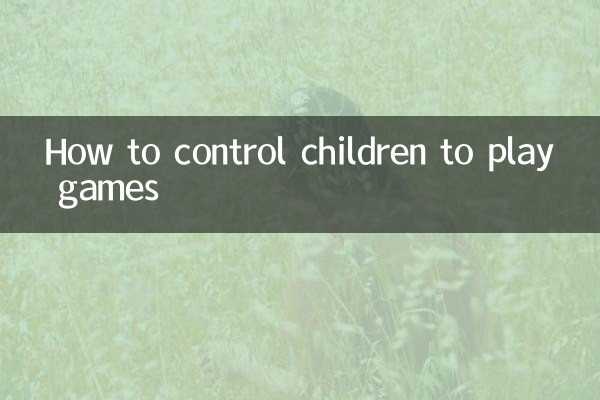How to control your children to play games: Scientific management and guidance
With the popularity of electronic devices, children's addiction to games has become a headache for many parents. How to scientifically control children to play games and balance entertainment and learning is one of the hot topics in current education. The following are analysis and suggestions compiled in combination with popular topics across the network in the past 10 days.
1. Recent popular games and children's behavior data

| Popular game titles | Average daily active users (child proportion) | Parent complaint keywords |
|---|---|---|
| "Honor of Kings" | 12 million (18%) | Recharge, stay up late |
| "Genshin Impact" | 8 million (15%) | Addiction, social isolation |
| "Egg Party" | 5 million (35%) | Skin consumption, distraction |
2. Three reasons why children are addicted to games
1.Social needs: Games have become a social carrier for peers, and data shows that 76% of children are exposed to games because of "friends are playing".
2.Achievement Feedback: The instant reward mechanism activates the secretion of dopamine in the brain, which is easier to get satisfaction than learning.
3.Lack of family supervision: Nearly 60% of parents admit that they have not formulated clear game time rules.
3. 5 ways to scientifically control games
| method | Specific operations | Validity (parent feedback) |
|---|---|---|
| Agreed time | Sign a written agreement to clarify the daily/weekly duration | 82% |
| Equipment Management | Use parental control mode (such as Apple screen usage time) | 76% |
| Alternative Activities | Arrange offline activities such as sports and art | 68% |
| Shared game | Parents participate in understanding the game content | 59% |
| Reward and punishment mechanism | Link game time to study performance | 73% |
4. Three bottom lines recommended by experts
1.Preschool children: It is recommended to ban video games completely to avoid affecting visual development.
2.Primary school students: No more than 30 minutes a day and must be used after completing the homework.
3.Middle school students: Weekend limited to 2 hours/day, recharge games are prohibited.
5. Common misunderstandings for parents
•Completely prohibited: It may lead to a rebellious mentality in children. It is recommended to gradually guide rather than forcefully cut off.
•Ignore content: 42% of parents have never checked the game rating (such as the PEGI/ESRB logo).
•Demonstration: 31% of children reported that "parents often browse their phones."
Conclusion: Controlling children to play games requires "combination of unblocking and blocking", helping children form healthy entertainment habits by establishing rules, providing alternative options and strengthening parent-child communication. The latest research shows that children's game addiction rate can be reduced by 57% in families using scientific management methods.

check the details

check the details